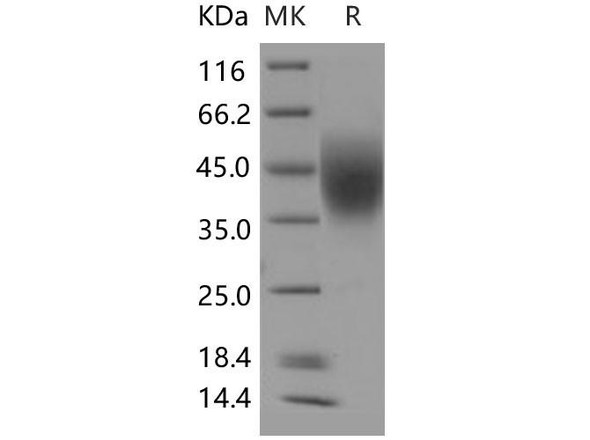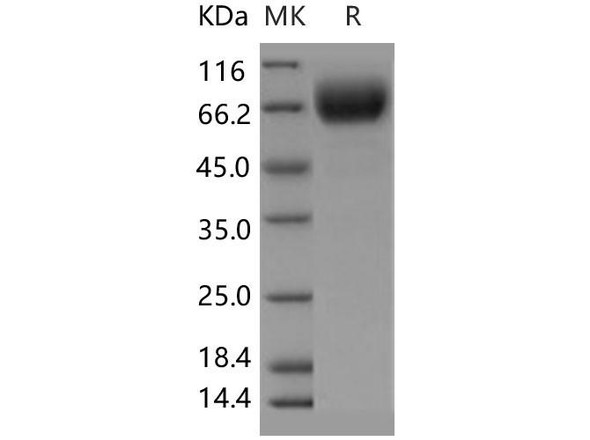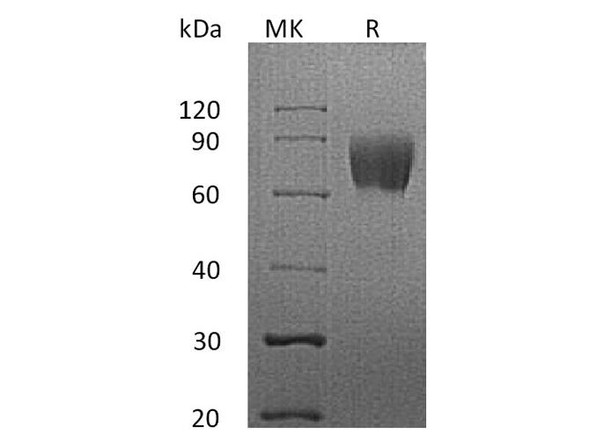Human CD58 Recombinant Protein (RPPB3083)
- SKU:
- RPPB3083
- Product Type:
- Recombinant Protein
- Species:
- Human
- Uniprot:
- P19256
- Research Area:
- CD Antigens
Description
| Product Name: | Human CD58 Recombinant Protein |
| Product Code: | RPPB3083 |
| Size: | 10µg |
| Species: | Human |
| Target: | CD58 |
| Synonyms: | Lymphocyte function-associated antigen 3 isoform 1, CD58, ag3, LFA-3, LFA3, Surface glycoprotein LFA-3. |
| Source: | Sf9 Insect cells |
| Physical Appearance: | Sterile filtered colorless solution. |
| Formulation: | CD58 protein solution (1mg/ml) contains phosphate buffered saline (pH7.4) and 10% glycerol. |
| Stability: | Store at 4°C if entire vial will be used within 2-4 weeks. Store, frozen at -20°C for longer periods of time. For long term storage it is recommended to add a carrier protein (0.1% HSA or BSA).Avoid multiple freeze-thaw cycles. |
| Purity: | Greater than 95.0% as determined by SDS-PAGE. |
| Amino Acid Sequence: | ADPFSQQIYG VVYGNVTFHV PSNVPLKEVL WKKQKDKVAE LENSEFRAFS SFKNRVYLDT VSGSLTIYNL TSSDEDEYEM ESPNITDTMK FFLYVLESLP SPTLTCALTN GSIEVQCMIP EHYNSHRGLI MYSWDCPMEQ CKRNSTSIYF KMENDLPQKI QCTLSNPLFN TTSSIILTTC IPSSGHSRHR HHHHHH |
CD33 is putative adhesion molecule of myelomonocytic-derived cells which mediates sialic-acid dependent binding to cells. CD33 prefers to bind to alpha-2,6-linked sialic acid. The sialic acid recognition site is masked by cis interactions with sialic acids on the same cell surface. In the immune response, CD33 perform as an inhibitory receptor upon ligand induced tyrosine phosphorylation by recruiting cytoplasmic phosphatases through their SH2 domains which block signal transduction through dephosphorylation of signaling molecules. In addition, CD33 induces apoptosis in acute myeloid leukemia.
CD58 produced in Sf9 Baculovirus cells is a single, glycosylated polypeptide chain containing 196 amino acids (29-215a.a.) and having a molecular mass of 22.5kDa. (Molecular size on SDS-PAGE will appear at approximately 28-40kDa).CD58 is expressed with a 9 amino acid His tag at C-Terminus and purified by proprietary chromatographic techniques.
| UniProt Protein Function: | Ligand of the T-lymphocyte CD2 glycoprotein. This interaction is important in mediating thymocyte interactions with thymic epithelial cells, antigen-independent and -dependent interactions of T-lymphocytes with target cells and antigen-presenting cells and the T-lymphocyte rosetting with erythrocytes. In addition, the LFA-3/CD2 interaction may prime response by both the CD2+ and LFA-3+ cells. |
| NCBI Summary: | This gene encodes a member of the immunoglobulin superfamily. The encoded protein is a ligand of the T lymphocyte CD2 protein, and functions in adhesion and activation of T lymphocytes. The protein is localized to the plasma membrane. Alternatively spliced transcript variants have been described. [provided by RefSeq, Jan 2009] |
| UniProt Code: | P19256 |
| NCBI GenInfo Identifier: | 126225 |
| NCBI Gene ID: | 965 |
| NCBI Accession: | P19256.1 |
| UniProt Secondary Accession: | P19256,Q5U053, Q6IB65, Q96KI9, A8K7G5, |
| UniProt Related Accession: | P19256 |
| Molecular Weight: | 27,960 Da |
| NCBI Full Name: | Lymphocyte function-associated antigen 3 |
| NCBI Synonym Full Names: | CD58 molecule |
| NCBI Official Symbol: | CD58�� |
| NCBI Official Synonym Symbols: | ag3; LFA3; LFA-3�� |
| NCBI Protein Information: | lymphocyte function-associated antigen 3 |
| UniProt Protein Name: | Lymphocyte function-associated antigen 3 |
| UniProt Synonym Protein Names: | Surface glycoprotein LFA-3; CD_antigen: CD58 |
| Protein Family: | Lymphocyte function-associated antigen |
| UniProt Gene Name: | CD58�� |










